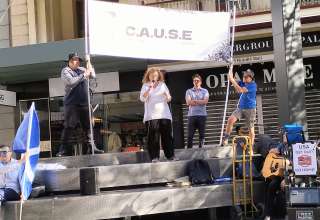CAPITALISM: A Barrel of Rotten Apples
By Humphrey McQueen
‘…price-protection is, and must always, remain the very first and foremost plank in any fighting platform worthy of the name, and hang the public!’
Southern Grocer, 1912.[1]
For most Australian capitalists in the first six decades of last century, tariff protection took second place to price-fixing, which undermined the ‘frugal comfort’ of the basic wage by driving up the cost of living. The enforcement of agreed prices ranged from bakers in a country-town[2] to the largest confectioners, Hoadley and MacRobertson, who were part of an international glucose cartel.[3] Patent-medicine firms had formed a Propriety Articles Trade Association in 1903 to maintain set prices for pharmacy lines, before covering other branded goods; in 1909, its Queensland branch gained the support of four of the largest manufacturers to supply its members at or below cost in order to undercut and thus drive out interlopers.[4] The Pharmacy Guild of Australia has perfected market control for 4,000 outlets.[5]
Of concern to many male workers in 1903 was the creation of a price-ring by six Melbourne breweries which combined in 1907 as Carlton and United to supply half of Victoria’s beer;[6] they also bought up the pubs.
After a 1911 NSW Royal Commission reported collusive tendering for public works, the Master Builders’ Association protested that illegal commissions ‘should be openly recognised’ as ‘universal and worldwide.’[7] Not just ‘universal’ it seems, but ‘eternal,’ as exposed eighty years later by the N.S.W. Royal Commission into Productivity in the Building Industry led the director of the Master Builders’ Association to resign for presiding over a clearing-house of corrupt practices.[8] Leightons’ rigging at the Sydney Casino[9] did nothing to stop CEO, Wal King, taking home $36m. a year to his five-car garage below his tennis court. Three ready-mix concrete firms were fined $19.8m. in 1996 for price-fixing. So it goes on.
Having conspired to fix prices, businesses had to conceal the fact. Melbourne barrister and later High Court judge, H.E. Starke, advised the Master Printers not to sue for defamation by a victim of their collusion because legal action would further expose their price-fixing, one arm of another international arrangement.[10]
The printers were being investigated by the Inter-State Commission, which the Founding Fathers envisaged would go after monopolisers. A Commission with that remit operated between only 1913 and 1920. Strange to say, the Constitution’s stalwarts in the Griffith Society have never been exercised by the failure to live up Sections 101 to 104.
Managers at Perth’s Swan Brewery used twenty-four code words to inform their Melbourne directors of discounts and other anti-competitive devices, safe from the eyes of the authorities.[11] Under investigation, coastal shippers destroyed all records of the combine they had set up in 1902, which they codenamed ‘Collins’ as if their ‘pool’ were an individual customer.[12] A Melbourne cartel of wool-brokers fleeced consumers through two world wars and the depression.[13]
Resale Price Maintenance (RSM) held until 1971 when the ACTU formed an alliance with Bourkes Department store in Melbourne. R.J. Hawke recalled the outrage at union interference with a free market where manufacturers supplied retailers on the condition that goods were sold at the set price. Were a retailer to offer lower prices, supply would be denied. Dunlop refused to fill orders from Bourke Stores until unionists made it clear that they would stop its business. Stopping RSM could not stop price-fixing or price-gouging.
More outlets will not make prices more competitive. The demise of the corner shop across the suburbs and its displacement by the likes of the 7-Elevens saw the rip-off of customers and staff alike. IGAs are several cents higher than the same items at the duopoly.
Advertising between competing brands and outlets informs our choices so that we can exercise consumer sovereignty at the margin of our preferences. So say the neo-classicals. A 1974 Joint Parliamentary inquiry into soaps and detergents found that outlays on marketing by Colgate and Unilever made their products more expensive, but gave that pair of wholly foreign-owned corporations 80 percent of the market.[14] Next year, the Broadcasting Control Board reported that the commercial media had chosen not to bitte the hands that fed them. For instance, the sales director at TCN-9 killed coverage of the Report.[15] Premium shelf-space in a supermarket remains the most expensive real estate in the country.
Property Developers lament that State and local governments fail to release sufficient land to meet housing needs. By scouring Annual Reports, Cameron Murray proves that the corporates sit on hundreds of hectares and tens of thousands of apartments waiting for prices to rise in order to extract monopoly rents.[16]
The Trade Practices Commission made little effort to stop the rackets of transfer pricing, for instance, by the uranium and aluminium cartels. Instead, its Chairman allocated no further cases to George Venturini, the one Commissioner who tried to do something from early 1975 to July 1977. Venturini documented the rackets in his Malpractice, a work calling out to be digitalised[17]
Some improvement came with the Australian Consumer and Competition Commission (ACCC). In 2008-09, QANTAS paid regulators around the world $200m. in fines. Conspirators added $US0.05 on every kilo of air freight. ‘Doesn’t sound a hellava lot, But give it to me every kilo, every flight ….’ That fraction of a cent flowed onto the prices.
Dick Pratt, meanwhile, was stealing hundreds of millions from every Australian in a price-fixing racket between his box-making business, Visy, and its rival, AMCOR, a conspiracy also adding to the price of every retail item. The aluminium cartel edged up the price of cans. In October 2007, the ACCC fined Pratt $36m. Had he been the boss of a bikie gang, the authorities would have confiscated his assets as the Proceeds of Crime. Next year, he was charged with lying to the ACCC.
A queue of gougers is ahead of us at the checkouts. Supermarket prices are the last in a long line of markups running up and down every supply chain.
That’s not all, folks! Swipe your credit card and you’re hit again. Fail to pay- off of your account each month and interest charges compound. Let’s not start on PayDay Lenders or Buy Now Pay Later. Or Anna Blight.
Pratt used a slice of his ill-gotten gains to buy good-will with tax-deductable philanthropy. Co-founder of the Transfield Corporation, and fellow patron of the arts, Franco Belgiorno-Nettis, told its official historian that his ilk cover-up their corruption and strong-arm tactics with ‘a veneer of civilisation.’[18]
Humphrey McQueen is the author of Australia’s Media Monopolies and The Essence of Capitalism.
[1] Southern Grocer, April 20, 1912, 623; see also May 20, 1911, 5.
[2] Australasian Bakers’ and Confectioners’ Journal, July 1904, 7.
[3] Sydney Morning Herald, September 2, 1907, 7c.
[4] Western Trader, March 1924, 16-17; Chemist and Druggist of Australasia, November 1909, 330.
[5] Cameron K. Murray and Paul Frijters, Rigged How Networks of Powerful Mates Rip Off Everyday Australians (Allen & Unwin: Crows Nest, 2022), 172-9.
[6] H.L. Wilkinson, The Trust Movement in Australia (Melbourne: Critchley Parker), 90-91.
[7] NSW Parliamentary Papers, 1911, vol. 1, pp. 681-926; NSW MBA Annual Report, 1911, no pagination.
[8] Royal Commission into Productivity, Report, N.S.W. Parliamentary Papers, vol. XX, Paper 267, 24-7 and 404-7; vol. XXI, Paper 272, 156-206; vol. XXII, Paper 293, 99 and 130.
[9] The Commissioner found King ‘not to be of good repute, having regard to character, honesty and integrity,’ N.S.W. Casino Control Authority, Report of Public Inquiry, 1994, 31-5.
[10] H.E. Starke to Victorian Master Printers, February 24, 1915, Melbourne University Archives, 101/55/3.
[11] Suzanne Welborn, Swan, The History of a Brewery (Nedlands: University of Western Australia Press, 1987), 115.
[12] N.L. McKellar, From Derby round to Burketown (St Lucia: UQP, 1977), 220-7 passim; although exposed in 1905, the combine was not sued by its customers, notably, the members of the Coal Vendwho were doing much the same, F.R.E. Mauldon, The Economics of Australian Coal (Parkville: Melbourne University Press, 1929), 76-79.
[13] David Merrett and Simon Ville, “Industry associations and non-competitive behaviour in Australian wool marketing: Evidence from the Melbourne Woolbrokers’ Association, 1890-1939,” Business History, 54, no. 4 (2012): 510-28.
[14] Joint Committee on Prices, Prices of household soaps and detergents (Canberra: AGPS, 1974), 29; Industries Assistance Commission, Report, 1975, 42.
[15] Australian Broadcasting Control Board, Report, August 7, 1975, 8-12.
[16] Cameron K Murray and Paul Frijters, Rigged How Networks of Powerful Mates Rip Off Everyday Australians (Allen & Unwin: Crows Nest, 2022), chapter 2.
[17] George Venturini, Malpractice (Sydney: non malare, 1980).
[18] Gianfranco Cresciani, Transfield, The First Fifty Years (Sydney, ABC Books, 1976), 170.





